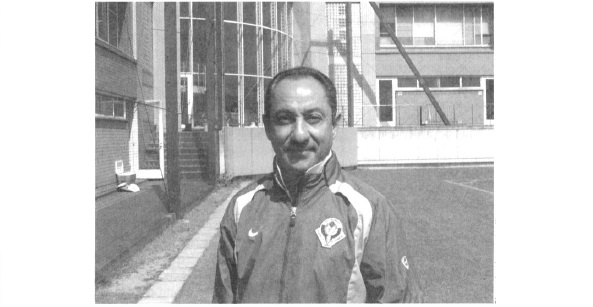by James Mulligan
Osvaldo “Ossie” Ardiles was a world-class soccer player, winning the World Cup with Argentina in 1978 and enjoying a successful career in England. Now managing Tokyo Verdy in the J.League, he talked to James Mulligan about his playing days, his globetrotting as a manager and the trouble with chairmen.
There is a small retro club in Tokyo, just off the main Roppongi drag, called Castillo. During World Cup 2002, the sobering depth of the club DJ’s record collection and musical knowledge came to light when my friend successfully requested Chas N’ Dave’s “Ossie’s Dream,” an obscure song from the ’80s released by a cockney pub duo about Argentinian soccer player Ossie Ardiles.
Amazingly, the song was a top five hit in England. Then again, Ardiles was hugely popular in England. He joined Tottenham Hotspur as a player after winning the 1978 World Cup with Argentina and his pocket-sized genius, work rate, even his way of calling his team “Tottingham,” endeared him to the public in a way few foreign players have since emulated.
Ardiles endeared himself
to the English public in a way
few foreign players have since emulated
Ardiles’ time at Tottenham was eventful Aside from inspiring the team to its most recent “glory years,” he starred in the film “Escape to Victory” with Sylvester Stallone and soccer legend Pele, was forced to leave England to play for Paris St. Germain during the Falklands War (“The single episode in my life that affected me more than anything else,” Ardiles says) and had the aforementioned song named after him. His career as a manager has been equally topsy-turvy.
We met at the Tokyo Verdy Club House, near Yomiuri Land. Ardiles, 51, has been manager of the J.League 1 club one month shy of a year. He is settled for the moment. But for much of his managerial career, he has been on the move, working in six countries.
His managerial career started in England with Swincon Town and ended with Tottenham Hotspur. After that, Ardiles was off on his travels. First came a short spell coaching Mexico’s Guadalajara, before his first stint in Japan, with Shimizu-S-Pulse.
From 1996, he enjoyed three successful years, winning the Nabisco Cup and Manager of the Year. While there, he also was the subject of a documentary, “Ossie Ardiles: Made in Japan,” which tracked Ardiles’ success to the backdrop of a soccer-fueled cultural revolution among Japan’s youth.
After S-Pulse, he was ready to return to English club management, but the phone call never came. Instead, he took up an offer to manage Croatia Zagreb. He didn’t stay for long. Top of the league, and in the Champions League, Zagreb came up against Champions League holders Manchester United and lost, resulting in Ardiles getting the sack.
The president of the club having died the week before, and the chairman also being the unpopular mayor of Zagreb didn’t help, either. “The fans were showing a lot of hostility, not towards me, but towards the club.. .but I was the one who left,” Ardiles says.
J.Leaguers Yokohama Marinos immediately came in for him. Ardiles quickly guided Marinos to the First Stage title in 2000 with a young Shunsuke Nakamura — who recently ran the England midfield ragged — starring. But at the end of the First Stage, club officials decided to start picking the team themselves, dumping two of Ardiles’ main players. Suddenly, the team fighting for the championship was decimated.
Sayonara, Ardiles-san.
Next stop was Al Ittihad — one of the top four teams in Saudi Arabia. This time, Ardiles’ reign was cut short in an even more bizarre fashion.
“We were top of the league, we hadn’t lost a game, and then the president changed, so the man who signed me changed. He (the new president) said if I did well and won the league, it would be down to the wisdom of the previous president, so he had to sack me and all the foreign players,” Ardiles says.
Ardiles then took the position of coach at Argentina’s Racing Club, the country’s third biggest team. He stepped into the shoes of a hugely popular coach who had just guided the team to its first championship in 35 years. But after a shaky start, Ardiles won over Racing’s fickle fans.
With the team playing good football, Racing were briefly top of the league, while competing for the Copa Liberdatores, the South American countries’ champions competition.
At the same time, Ardiles had to deal with the kidnapping of the father of Racing Club player Diego Milito, who was eventually released unharmed. “Very tense,” is how Ardiles remembers the situation.
After the team bowed out of the Copa Liberdatores despite losing no games, Ardiles resigned.
“I thought we couldn’t achieve anymore…we had reached our ceiling and there were a lot of players moving, and there had to be a big renovation…so I decided to leave,” he says.
He left Argentina with a heavy heart. Ardiles always dreamed of coaching the national team (his mentor is Cesar Luis Menotti, Argentina’s coach in 1978), and he has said before he wants to work in Argentina again.
‘When there is political
turmoil within a club, it is
always the manager who pays the price’
And England?
“I would love to. When I left Tottenham, people may say I blew my chances…but I don’t particularly think so. In fact, my record is quite good in England.”
Ardiles faced turmoil in England to match any he has contended with overseas. In his first season as manager at Swindon Town in 1989-90, he led the club to the top division (they were later demoted) while a storm brewed over irregular payments Swindon had made to players. Did Ardiles know much about the severity of the situation?
“Of course…the police came and put my captain in jail,” he says, only half-joking.
He also managed the team he played for, Tottenham Hotspur. His chairman was notorious Amstrad boss Alan Sugar. Surely, out of all the chairmen he worked for, his relationship with Sugar was the most fraught, no?
“It was normal. I have a good relationship with him right now. He never interfered with the team. Of course he was a hands-on chairman. He wanted to know everything and was very up to date with what was happening.”
Ardiles says a fallout between Sugar and previous manager Terry Venables caused the team to perform poorly in his first season with Spurs and ultimately cost him his job.
“There were a lot of players there who didn’t want to play for Alan Sugar.”
For Ardiles, though, managing Tottenham is the one job where he feels he had unfinished business.
“I have to say we were going places.”
Ardiles’ managerial record is patchy, with big successes and relative failures. But he believes chairmen are sometimes too quick to sacrifice the manager.
“I don’t want to put myself as a victim whatsoever, but when there is political turmoil within a club, it is always the manager who pays the price,” he says.
Verdy has faith in Ardiles, and he is looking to repay this. He is pleased with what was achieved last season but believes the squad is too small. Verdy had a poor start to this season, losing its first three games, but the team has recently rallied and, at the time of writing, is unbeaten in the Nabisco Cup.
“If we have two or three injuries, though, the rest of the team is affected a lot,” Ardiles says. Cameroon international Patrick Mboma’s recent return from injury has been vital for Verdy.
Asked if he would be interested in any of the overseas-based Japan players, Ardiles quickly replies, “All of them. We have been talking about what we have to do to compete with the Jubilos (Jubilo Iwata), and we need a strong pool of Japanese players. If any became available, we would be interested. Of course I would be happy with, say, Junichi Inamoto.”
Ardiles has also just unearthed Takayuki Morimoto, a powerful 16-year-old phenom, who recently signed his first professional contract. A dead ringer for a young Ronaldo, he is tipped to be the next Japanese superstar.
“He has the character, personality and skill to go a long way,” Ardiles says.
As Ardiles chats away in the Verdy boardroom overlooking the lush training fields, it’s obvious he is comfortable here. A non-meddling chairman and a rumored million-dollar salary may go some way to explaining this.
Unless Argentina or a big English club comes calling, the next chapter in Ardiles’ globetrotting career as a manager will have to wait.
“I’m very happy here. I love Verdy, love Tokyo,” he says.
And Tokyo loves Ossie, if the Castillo crowd is anything to go by. I suggest he come to the club to dance to “Ossie’s Dream.”
“I have it on CD,” he says. Maybe I’ll bump into him there.









